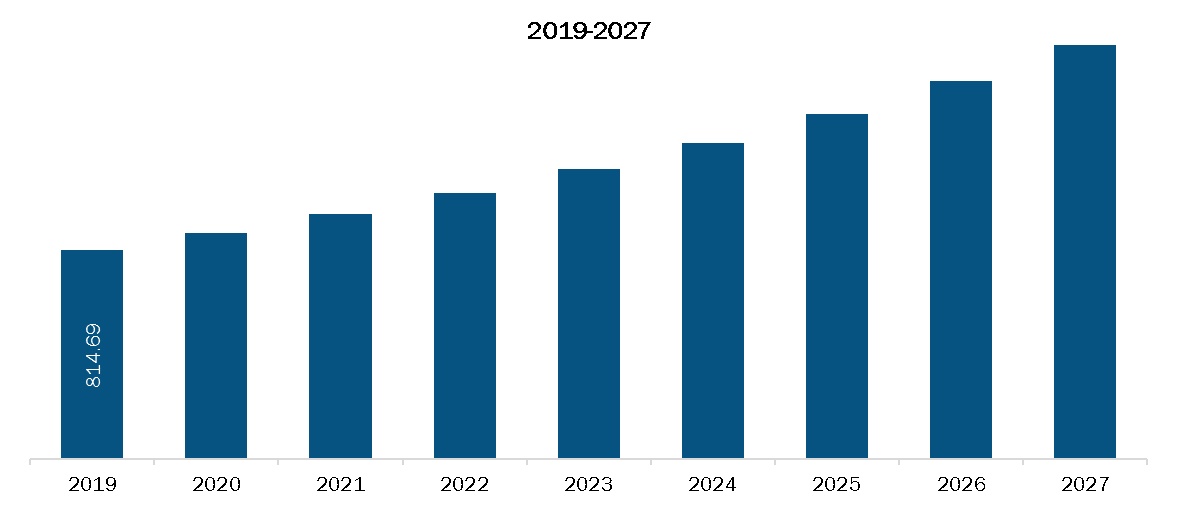The North America automated dispensing systems market accounted to US$ 814.69Mn in 2019 and is anticipated to grow at a CAGR of 7.8% to account for US$ 1,479.76Mn by 2027.
The market growth is estimated to be largest due to several driving factors such as large usage of automated dispensing systems in pharmacies, high awareness for automated systems, increasing prevalence of chronic diseases and growing geriatric population. However, problems associated with automated dispensing systems such as excessive use of overrides in cabinets with patient profiling and placing wrong program input are likely to pose a negative impact on the market growth.
Medication error is irrational, inappropriate, and ineffective medication dispensing that has the potential to harm the patient. Annually, the US Food and Drug Administration (FDA) receives over 1,00,000 reports that are associated with medication error. Further, as per the study on “Medication Errors” published in Stat Pearls in June 2020, every year around 7,000 to 9,000 people die in the US due to medication error. In the wake of the increasing incidence of deaths caused by medication errors, government agencies across the globe have started encouraging hospitals and pharmacies to implement advanced technologies for dispensing accurate dosage of medicines to manage medical conditions more effectively.
Hospitals are adopting advanced technologies such as automated dispensing systems to store, dispense, and track medicines in order to improve efficiency and patient safety. These systems enhance the efficiency of medication distribution and also minimize the medication errors in hospitals. As the majority of geriatric population suffers from various chronic diseases, there is increase in the demand for advanced medication.
The emerging markets in the developing countries are giving better opportunity for the major players to expand their business. Several companies are actively involved in developing novel, advanced medication management solutions for hospitals and pharmacies and applying error-free, fully automated medication management systems, with a strong focus on work flow of automated dispensing systems.
However, the COVID-19 pandemic is perplexing healthcare institutions in the region with unprecedented operational and clinical challenges showing a negative impact on market growth.. Research institutes, Pharmaceutical, and Biotech companies are engaged in collaborative work to address the COVID-19 outbreak.
North America Automated Dispensing Systems Market Revenue and Forecast to 2027 (US$ Mn)

- This FREE sample will include data analysis, ranging from market trends to estimates and forecasts.
North America Automated Dispensing Systems Market–
North America Automated Dispensing Systems Market– By Operation
- Decentralized Systems
- Centralized Systems
North America Automated Dispensing Systems Market– By Application
- Out-Patient Automated Dispensing
- In-Patient Automated Dispensing
North America Automated Dispensing Systems Market– By End User
- Retail Pharmacies
- Hospital Pharmacies
- Others
North America Automated Dispensing Systems Market– By Country
- United States
- Canada
- Mexico
Company Profiles
- Cerner Corporation
- Capsa Healthcare
- OMNICELL INC.
- ARxIUM
- Accu-Chart Plus Healthcare Systems
North America Automated Dispensing Systems Report Scope
| Report Attribute | Details |
|---|---|
| Market size in 2019 | US$ 814.69 Million |
| Market Size by 2027 | US$ 1,479.76 Million |
| CAGR (2020 - 2027) | 7.8% |
| Historical Data | 2017-2018 |
| Forecast period | 2020-2027 |
| Segments Covered |
By Operation
|
| Regions and Countries Covered |
North America
|
| Market leaders and key company profiles |
|
- Historical Analysis (2 Years), Base Year, Forecast (7 Years) with CAGR
- PEST and SWOT Analysis
- Market Size Value / Volume - Regional, Country
- Industry and Competitive Landscape
- Excel Dataset
Recent Reports
Testimonials
Reason to Buy
- Informed Decision-Making
- Understanding Market Dynamics
- Competitive Analysis
- Identifying Emerging Markets
- Customer Insights
- Market Forecasts
- Risk Mitigation
- Boosting Operational Efficiency
- Strategic Planning
- Investment Justification
- Tracking Industry Innovations
- Aligning with Regulatory Trends






















 Get Free Sample For
Get Free Sample For